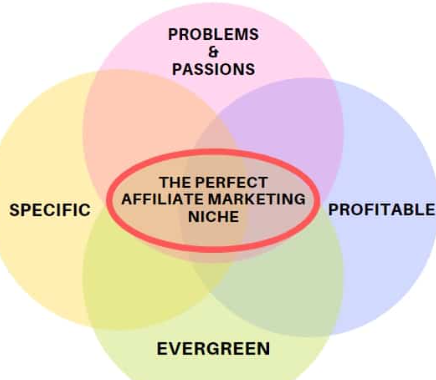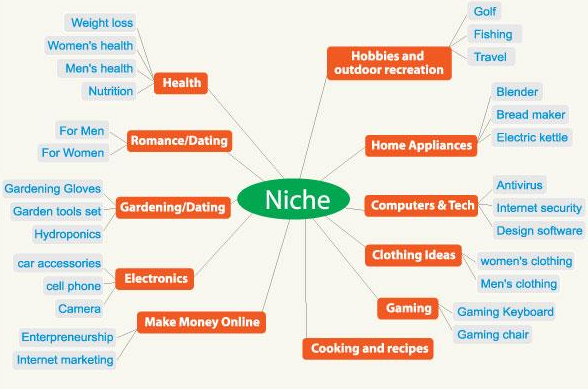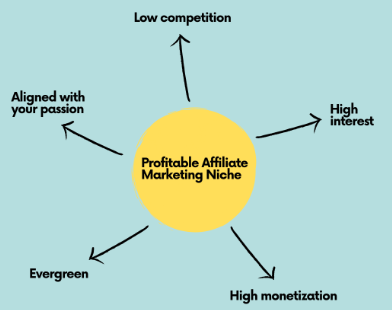
Affiliate marketing might sound like some techy buzzword, but it’s actually pretty straightforward. Basically, it’s about promoting other people’s products and earning a commission when someone makes a purchase through your unique affiliate link. Imagine being the middleman between a shopper and the product they’re looking for.
Here’s the deal. You sign up with a company to be their affiliate (sometimes called a partner). They’ll give you a special link to their products or services. Every time one of your followers clicks that link and buys something, you get a cut of the sale. Simple, right?
Several key players make this whole system work. First off, you’ve got the merchants – these are the companies or individuals who have products or services to sell. Then, there are the affiliates (like you), who promote these products. And finally, there are the consumers, who buy the products.
Affiliate marketing can happen practically anywhere online – blogs, social media posts, YouTube videos, and even email lists. It’s pretty versatile, making it a sweet gig for folks who want to make some extra cash or even build a full-time business around it.
What is an Affiliate Marketing Niche?

An affiliate marketing niche is basically your area of focus within the giant world of affiliate marketing. It’s a specialized segment where you direct all your efforts. Instead of trying to promote random products, you zero in on a specific category or topic. Think of it like picking a major in college – it helps you concentrate and become really good at that one thing.
Examples of niches are endless. You could get into health and wellness, tech gadgets, beauty products, pet care, or financial advice. The key is to choose something you’re interested in or passionate about. Trust me, it makes the whole process much more enjoyable.
Why does this matter so much? Well, picking a niche allows you to build a focused brand and a loyal audience. When people know what to expect from you, they’ll keep coming back for more. It also makes your marketing efforts more effective since you’re targeting a specific group rather than trying to appeal to everyone.
An excellent niche isn’t just about what you like, though. It’s got to have a demand. No point in focusing on something nobody cares about, right? So, you need to check if people are actually searching for information and products in your chosen area. The ideal niche hits the sweet spot between your interests and market demand.
The Importance of Choosing a Niche

Choosing the right niche is like setting the foundation for a house. Get it right, and everything else becomes more manageable. A well-chosen niche offers several benefits that can make or break your affiliate marketing journey.
First up, expertise. When you stick to a particular niche, you become an expert in that field. Over time, your audience will see you as a trusted source of information. This credibility makes it easier to convert visitors into customers. Who wouldn’t buy from someone who clearly knows their stuff?
Next, targeted marketing. Having a specific niche means your marketing isn’t all over the place. Your efforts will be laser-focused, and you’ll attract people who are actually interested in what you’re promoting. It’s much easier to sell ski gear to winter sports enthusiasts than to a random group of people.
Lastly, there’s the community factor. A niche helps build a tight-knit community around your brand. People like feeling part of a focused group with common interests. This sense of belonging keeps them engaged and more likely to follow your recommendations. You’ll find it easier to create content, foster discussions, and encourage repeat visits.
There are plenty of success stories to draw inspiration from. Take the fitness niche, for example. Many people have built entire businesses around offering workout tips, nutritional advice, and recommending fitness products. By focusing exclusively on fitness, they’ve carved out a name for themselves and garnered a loyal following.
Precision is key. It’s easier to remember 10 things about a narrow topic than trying to be a jack-of-all-trades. Whether it’s cooking, gardening, or tech gadgets, picking the right niche sets you up for success.
Top Niches for Affiliate Marketing
Picking the right niche can sometimes feel like choosing a needle in a haystack, but some areas have consistently performed well. Here are some of the top niches to consider if you’re diving into affiliate marketing.
Health and Wellness: This niche is evergreen. People are always interested in fitness, mental health, nutrition, and overall well-being. There are a plethora of products and services to promote – from supplements to fitness programs.
Wealth and Finance: Everyone wants to learn how to make money, save money, or invest it wisely. This niche includes sub-niches like personal finance, stock market, real estate, and even cryptocurrency. It’s a goldmine of opportunities.
Technology and Gadgets: Tech enthusiasts are always on the lookout for the latest gadgets, software, and tech innovations. Whether it’s reviewing new smartphones, smart home devices, or gaming gear, this niche is brimming with options.
Lifestyle and Hobbies: This is a pretty broad category but highly effective. Think about fashion, beauty, DIY crafts, photography, and even pet care. If it’s a hobby or a part of someone’s daily life, there’s likely an affiliate program for it.
Travel and Tourism: People love to explore the world, and they’re always looking for tips, tricks, and travel gear to make their adventures smoother. Flights, hotels, travel insurance, and gear like backpacks and travel guides can be promoted here.
Beyond these mainstream options, there are countless other niches you can explore. The key is to find a niche that not only interests you but also has a dedicated audience willing to spend money. Consider what you’re passionate about and where there’s a genuine demand.
How to Choose the Best Niche

Picking the perfect niche for affiliate marketing isn’t a one-size-fits-all deal. It takes some thought and a bit of research.
Start with your interests and expertise. What do you love talking about? Is there a subject you’re particularly knowledgeable about? Being passionate about your niche will keep you motivated and make content creation feel less like a chore and more like fun.
Next, scope out the market demand. Use tools like Google Trends or keyword research to see what people are searching for. Higher search volume often indicates higher demand, but remember, more demand sometimes means more competition.
Speaking of competition, it’s something you can’t ignore. Look at existing websites and blogs in your potential niche. Are they well-established? If the top results are dominated by huge players, you might want to reconsider or find a less competitive sub-niche. The goal is to find a sweet spot where there’s demand but not an overwhelming amount of competition.
Profitability is another deciding factor. Check out affiliate programs in your niche and see what the commission rates are like. Also, consider the types of products or services you’ll be promoting. High-ticket items might bring in more money per sale, but they can be harder to sell. Low-ticket items might sell more easily but bring in smaller commissions.
Lastly, think about long-term trends. Is your niche sustainable? Some topics are evergreen, like health and finance, whereas others might be fads that fade away. Choose a niche that has staying power so you’re not constantly having to pivot to new trends.
By balancing your interests, market demand, competition, and profitability, you’ll find a niche that’s well-suited for your affiliate marketing efforts.
People-First Content in Affiliate Marketing

Creating content that genuinely helps people should be your top priority. When you focus on delivering real value, everything else, including profits, tends to fall into place. This approach, often termed people-first content, is all about providing useful, engaging, and relevant information to your audience.
Balance is key. While promoting products is part of the game, your content shouldn’t read like a string of advertisements. Offer in-depth reviews, how-to guides, and expert advice that helps your audience make informed decisions. When people see that you’re providing valuable information, they’re more likely to trust your recommendations.
Trust builds long-term relationships. When you consistently put your audience’s needs first, you’re not just chasing one-off sales. You’re earning loyal followers who will keep coming back for more. This loyalty can translate into repeat business and higher conversion rates.
Engagement matters. Encourage comments, questions, and discussions on your posts. Respond to your audience, address their concerns, and listen to their feedback. Engaging with your audience builds community and makes them feel valued.
Transparency is crucial. Be upfront about your affiliate relationships. Let your audience know that you earn commissions on some of the products you recommend. Honesty builds trust, and trust is the foundation of any successful affiliate marketing strategy.
To sum it up, creating people-first content involves delivering value, building trust, encouraging engagement, and being transparent. When you focus on these elements, you’re set for long-term success in affiliate marketing.
E-E-A-T in Affiliate Marketing

E-E-A-T stands for Experience, Expertise, Authoritativeness, and Trust. These principles are essential for building a successful affiliate marketing business.
Experience comes from first-hand encounters and genuine interactions with the products or services you recommend. Share your own experiences and real-life examples. Your audience will appreciate the authenticity.
Expertise is about knowing your stuff. Your content should reflect in-depth knowledge and understanding of your niche. Doing thorough research and staying updated with industry trends helps you maintain your expertise.
Authoritativeness involves being recognized as a reliable source of information. This can be built by getting endorsements from other experts in your field or featuring collaborations. Guest posts, interviews, and mentions from reputable sites can boost your authority.
Trust is the glue that holds everything together. Build trust by being transparent, honest, and consistent. Avoid promoting products you don’t believe in. Always be upfront about your affiliate relationships so there’s no ambiguity.
Implementing E-E-A-T principles not only helps improve your search engine rankings but also fosters a loyal audience. Your readers will keep coming back, knowing they can rely on you for trustworthy and insightful content. By following these guidelines, you’re setting up a strong foundation for a thriving affiliate marketing business.
SEO Best Practices for Affiliate Marketers

Start with keyword research. Identifying the right keywords is crucial for getting your content in front of the right audience. Use tools like Google Keyword Planner, Ahrefs, or SEMrush to find keywords that have good search volume but aren’t overly competitive.
Implement both on-page and off-page SEO. On-page SEO involves optimizing elements within your control, like headlines, meta descriptions, and internal links. Off-page SEO focuses on building quality backlinks from reputable websites, which boosts your site’s authority.
Quality content is king. Search engines love content that is informative, engaging, and valuable to readers. Write articles, how-to guides, and reviews that provide real insights and address common questions or problems your audience faces.
Use SEO-friendly URLs. Make sure your URLs are short, descriptive, and include your target keywords. Avoid messy URLs with lots of numbers and symbols.
Optimize for mobile. More than half of web traffic comes from mobile devices. Ensure your site is mobile-friendly by using responsive design, compressing images, and speeding up page load times.
Don’t overlook the importance of site structure. A well-organized site makes it easier for search engines to crawl and index your content. Use categories and tags correctly, and make sure your sitemap is up to date.
Utilize SEO tools and analytics. Tools like Google Analytics and Google Search Console provide insights into how your site is performing. They can show you what’s working and what needs improvement, allowing you to tweak your strategy accordingly.

Hello. I think that the best niches for affiliate marketing are quite often very competitive. I think it’s best to pick something that you are passionate about because there are so many setbacks that you will give up if you don’t have passion. And your best work will be doing something that you love so that’s what I would go with.
Hi Jake, i agree it needs to be something you are passionate about however research is required to find sub-niches with in your passion that consumers are interested. its a fine balance between passion and demand 🙂 research.. research.